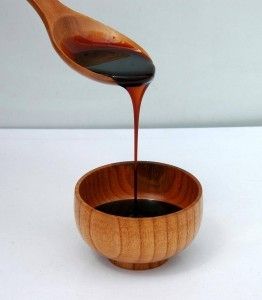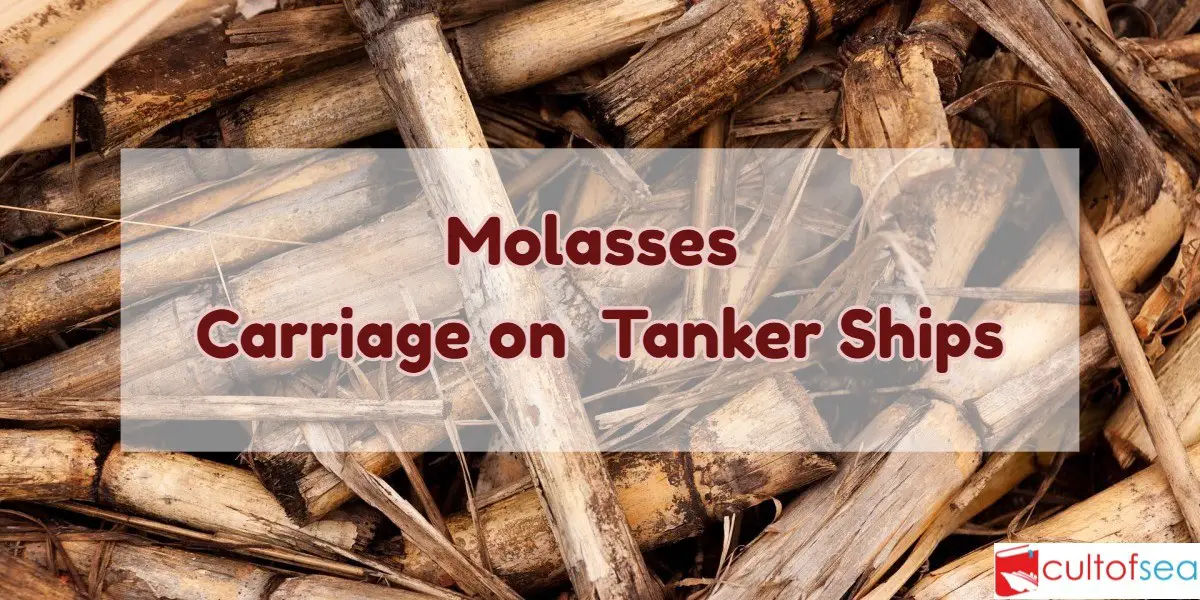GENERAL
Molasses is the thick dark brown syrupy liquid left after sucrose has been removed from the mother liquid in sugar manufacture. There is two type of molasses – cane molasses and beet molasses. Blackstrap molasses is the syrup from which no more sugar can be obtained economically.
Synonym of molasses – Treacle.
Main composition of molasses at 75 % Dry Matter
| Cane molasses | Beet molasses | |
| Sucrose | 30 – 40 % | 48 – 52 % |
| Reducing sugars | 15 – 20 % | 0.2 – 1.2 % |
| Organic non-sugar matter | 9 – 12 % | 12 – 17 % |
| Sulphated ash | 3 – 11 % | 3 – 10 % |
Solubility
The solubility of sucrose is affected by the presence of reducing sugars and inorganic ash. In general, reducing sugars decrease the solubility of sucrose and inorganic ash increases it.
Viscosity
The viscosity of both beet and cane molasses is influenced by constituents other than sugar. Beet  molasses is usually of lower viscosity, particularly at ambient temperatures than cane molasses, but in both cases, it is affected by the dry matter content. Molasses exhibits the phenomenon called critical viscosity which means that above a certain dry matter content the viscosity increases at a greater rate than might be expected from the increased dry matter content. The critical viscosity for cane molasses lies between 81 and 85º hydrometer brix. The viscosity of molasses is affected both by dry matter and temperature, for example, a rise in temperature of 10 ºC may reduce the viscosity to half or less and a reduction in the dry matter content will also decrease viscosity.
molasses is usually of lower viscosity, particularly at ambient temperatures than cane molasses, but in both cases, it is affected by the dry matter content. Molasses exhibits the phenomenon called critical viscosity which means that above a certain dry matter content the viscosity increases at a greater rate than might be expected from the increased dry matter content. The critical viscosity for cane molasses lies between 81 and 85º hydrometer brix. The viscosity of molasses is affected both by dry matter and temperature, for example, a rise in temperature of 10 ºC may reduce the viscosity to half or less and a reduction in the dry matter content will also decrease viscosity.
Molasses may have a viscosity of several hundred centistokes whereas very heavy lubricating oil may be in the region of 100 centistokes.
Molasses is not Newtonian fluid and pump ability does not only depend on viscosity but very much on where it is coming from, storage time, fermentation process, brix value and last but not least, the temperature during the period the fluid are onboard the ship.
The Brix number is a measure of the sugar concentration and equals the percentage by weight of sucrose in solution. Brix number usually in the range of 80 – 90. Coatzacoalcos 86.16, Karachi 84, Red Sea 84, Buenaventura 85. Molasses from Karachi is considered good molasses, however, those with Brix number 87/89 are considered very thick and lousy to discharge.
Fermentation of molasses
The visual effect of fermentation in molasses is an increase of volume and the creation of a layer of foam in, and especially on top of the molasses. Besides the development of foam, the temperature sharply increases a couple of ºC per 24 hours, and at all times an alcoholic odour can be observed, sometimes in combination with the odour of acetic acid. Fermentation can be stopped by blowing air into the molasses, the available oxygen will destroy the anaerobe bacteria and the entire fermentation stops.
Explosion and Health Hazard data
Molasses is non-flammable and non-toxic substance. Molasses fermentation occurs when molasses is diluted with salt or fresh water and is accelerated by heat. During fermentation CO2 (with possible traces of ethanol and higher alcohol vapour ) is given off, which will produce inhalation hazards in the compartment containing molasses residue. Reacts with concentrated nitric and concentrated sulfuric acid.
PRIOR TO LOADING
- A clean dry tank is all that is required.
- Zinc coatings have restrictions regarding the pH – check coating guide.
- Check heating coils and ensure that steam traps are in perfect condition.
- Check cargo pump book for viscosity limits
- Purge all Framo cargo pump cofferdams and ensure no leakage in seals. Fill cofferdams with fresh water.
LOADING
Loading to be started carefully via drop line ( avoid free fall loading ).
For Japanese pumps – it is important to maintain the low-pressure air buffer on the cargo pump cofferdam space to avoid molasses entering and crystallising in the pump cofferdam.
Obtain heating instruction and full specification from the shipper, otherwise a letter of protest to be issued.
HEATING DURING THE VOYAGE
Generally during the voyage to be maintained temperature 35 – 38ºC, for discharging 40-41ºC.
At a temperature 40ºC molasses is relatively stable but as the temperature is raised sugar may be lost by thermal decomposition. At temperature over 60ºC, there is always the possibility of thermal decomposition and complete destruction of cargo.
Heating instruction to be strictly followed and heating log completed. It is important to maintain accurate temperature. Note that temperature should be measured at several places and levels within the tank as the different temperature can be experienced. When ballasting if possible keep tanks slack to avoid tank top cooling down too quickly.
It is important to check p/v valves daily for the good operation to avoid tank overpressure.
DISCHARGING
- During discharging maintain the highest allowed temperature for the best discharge rate.
- Use as big as a discharge hose available, avoid too many pipe bends and pressure losses on the discharge line.
- Booster pump to be in use if fitted.
- It is better to run the cargo pumps at reduced speed and reduced hydraulic pressure due to foaming and cavitation. Reduce pump further when the tank is about ¾ empty.
- Arrange small water flow through cofferdam during discharge. This water flow will wash away any molasses and have a good cooling effect on seal arrangement.
- For Japanese pumps – maintain the low-pressure air buffer on the cargo pump cofferdam.
- Ensure that coils are turned off in good time to avoid caramelization.
- If there is too much foam in the molasses during last part of discharge there are several methods with an agreement with surveyors/receivers:
- Adding of non-toxic chemicals
- Recirculation through drop line
- Injection of live steam
TANK CLEANING
If live steaming has been carried out during discharge than a good hot water wash is all that is required.
If caramelization has occurred on the coils then after tank clean and dry crack coils with steam and wipe with rags.
When molasses stowed in zinc tanks check pH and if less than 7, use alkaline safety liquid to neutralise the acid.


I genuinely prize your work, Great post.
Dear,
We need vessel to ship 100 thousand tons of Molasses from Karachi to Kuwait. This is first time i am getting involved. I have secured buyer and product is also arranged.
Please let us know what is required and guide us how it will be done.
Thank you,
Muhammad Salahuddin Usmani
Director DAS
15 Club Road, Businessman Colony,
Rahim Yar Khan.
Land Line: 068-5880800
Mobile : 0334-4880800
Please Mr Muhammad Salahuddin Usmani .. if you get the vessel let me know .. becaise i need one for transport 5000 tons to Syria
thanks
my mobile is +201006166692 Egypt (whatsapp)
hi there is a company that is looking for a tanker truck to transport molasses syrup from one plant to the other my question is what type of tank must i get they need 110 ton per day thank you
Hello, molasses is usually carried in container trucks and the container containing a Flexitank. Flexitank is a liquid bulk packaging product, which is compounded of the food-grade PE lining and high-strength, corrosion-resistant,high-temperature-proof PP outerwear.Flexitank can be used to temporarily convert the common 20 feet shipping container to store and transport bulk liquid container. I think max lift in a container will be around 35t. Hope this helps.
This is not known useful. Because if you own large quantities .. How to transport them through containers …. Must be a ship dedicated to transport molasses
This is Simon did you get the Molasses vessel
I am looking for one also
molasses generally carried by sea in specialised tankers in quantities from 2000 mt parcels up to 30/40 kt parcels. The large volume trade is controlled by the major producers, but spot trade is available.
for 100 thousand mt at least you require 3 tankers
where is your cargo , it is available in keamari Karachi or still at sugar mill.
its a cane molasses or beet molasses
WE HAVE GOOD QUALITY SUGAR CAN MOLASSES FROM INDIA MOSTLY WE SHIP IN CONTAINERS ANY ONE LOOKING FOR CONTACT US ; vinesh@jepson.in /+919867570900